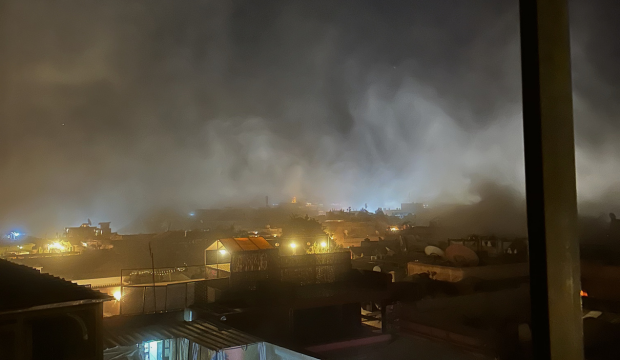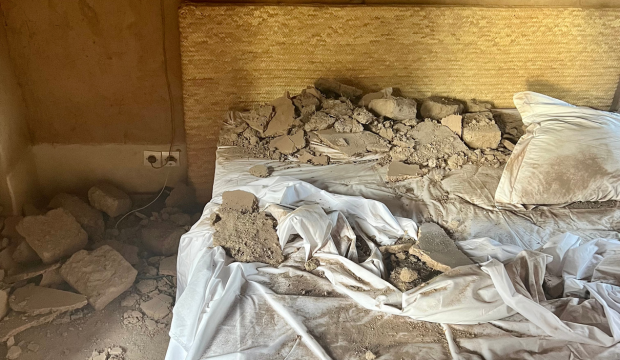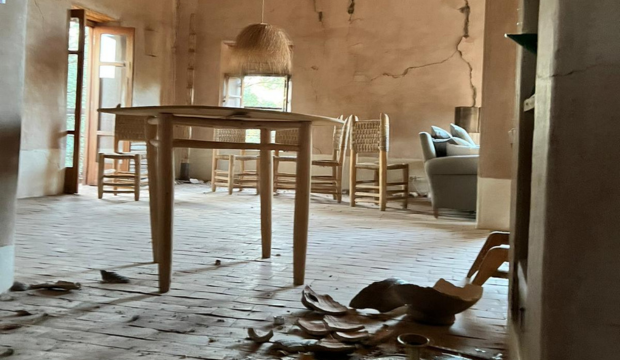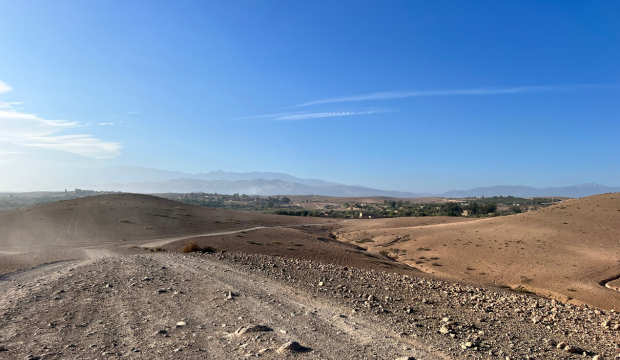After the Quake
Culture Whisper's editor-in-chief Eleonore Dresch shares her personal account of what happened in Marrakesh and beyond during the earthquake that shook Morocco
After the earthquake in Morocco: a bedroom at the Berber Lodge
We arrived in Morocco the day before the quake. We were staying at the Berber Lodge, located 40 minutes away from Marrakesh, a gorgeous property owned by the delightful interior designer Romain Michel Menière and a bit of a secret spot for the glitterati world travellers.
Romain himself, with the help of Studio KO, the architects behind the Yves Saint Laurent museum in Marrakesh – designed the lodge. Our room, built in traditional pizé – mud and bricks, was minimal and elegant, with its ochre tiles and simple chimney.
We were there to spend a long weekend with a group of friends from all over the world. On the night of the 8th, we drove to Marrakech to meet them for a dinner party on the top terrace of the glamorous hotel restaurant El Fenn in the Medina.
We walked up the magnificent circular staircase to the top terrace where a breathtaking view of the Marrakesh skyline and the Kutubiyya could be enjoyed. The dinner started fashionably late, and as we ate our tajine, the grounds began shaking violently. Glasses broke, and plates clattered. After a couple of seconds, it all became dark, and I wondered whether the terrace would collapse under our feet. I started counting in my mind. I counted up to 10, and then the tremor stopped. Around us, a giant cloud was hovering over the city, reminding us of 9/11 … We could hear people screaming on the street. Some of our party rushed to the staircase; I was keen to linger, feeling, probably wrongly, that we were safer where we were. The terrace was a shamble, but the staff calmly invited us to come down. I grabbed a bottle of vodka (who knew what was coming?) from the table and started the journey down the spiral staircase.

The street was full of people calling family, smoking and hugging. Mexican girls in evening dresses came joined us and we shared the vodka. They told us they were used to earthquakes in Mexico City but had never experienced this. They wanted to leave the country as soon as possible.
The atmosphere was eerie but strangely peaceful. We were all grateful to be alive but aware of the drama's danger and size. Moroccans kept telling us that it was not possible, that they had never experienced an earthquake in Marrakesh. Some friends who were staying nearby decided to walk to their hotel. The Berber Lodge was far away, so they invited us to stay with them. We were keen to return to the Lodge, thinking it would be much quieter, away from the drama. We called our driver, who told us his car had been crushed. 'No problem,' he said, showing remarkable resilience. 'I will come with a friend and drive you back to the hotel,’. And he did, 20 minutes later. We called our children, who were more preoccupied with the Rugby World Cup than news of their parents experiencing an earthquake. Reports hadn’t reached the newsrooms yet.
Our assumptions that the Berber Lodge would be an escape from the quake were quashed when we realised we were in fact driving towards the epicentre.
We arrived at the pitch-black property and pushed our way through the entrance door, which was covered in rubble. Crossing the empty ground, we reached a corridor lit by candles. Broken pieces of pottery, rubble and thick dust laid everywhere. The guests were all gathered in the garden. Romain and his staff were bringing food and drinks. They said no one had been injured, but it was very close. Had we checked our room, they asked. We hadn’t. When we opened the door, we found it in ruins. The wall above our bed had partly collapsed, covering our pillows with heavy bricks.

A young Dutch couple who was staying next door were starting to fall asleep when the tremor began. They rushed outside naked. Feeling utterly embarrassed, the young lady returned to grab a sheet just as the wall collapsed. It was a narrow escape. Another couple couldn’t find the keys to their door and had to flee through the window.
The staff – the Berber Lodge employs 23 people, who all come from the nearby village were beginning to learn about the situation of their homes and loved ones. Yet a few of them stayed at the lodge, attentive and supportive, bringing us fruit and candles.
We decided to sleep by the pool, on the loungers under the old olive trees. We went to grab our dusty pillows, sheets and blankets from our beds, shook them and settled for the night. The wild dogs were barking, the stars were shining, and prayers could be heard through the night.
I got up around 3am, when everyone was asleep, and I walked back to the lodge. The lights had come back on, lighting the interior, creating an otherwordly image. Some old ceramics had miraculously survived in the grand salon, but most were at least partly destroyed and covered with dust. I switched off the lights one by one and returned to my temporary bed.

We stayed quiet and calm the following days, observing helicopters flying back and forth to the Atlas Mountains – the worst hit area of the country.
We were all tired, having barely slept the first night. The adrenaline had gone, and the gradual realisation of the damage and death toll was sinking in. People around us had lost loved ones. In the kitchen, one of the lovely cooks was crying. Her house had gone, and she was a single mum. Romain said it costs at least 5,000 euros to rebuild a home here. An enormous amount for them. Another staff member, ashen-faced, had just learnt that his best friend had lost his wife and daughter.
We decided to stay until the end of our planned weekend. With his staff's help, Romain looked after us in the kindest possible way. He moved us to a bedroom which was less damaged but refused to take any payment for the room, inviting us instead to contribute to a local fund to rebuild houses. He drove us in the morning to the airport, as no more taxis were available. We hugged everyone goodbye.

The Morocans' behaviour was utterly dignified, kind and efficient all the way through the crisis.
As the weekend drew to a close, an immense sadness engulfed us all. Death and desolation were now palpable everywhere and in everyone. Many families from the village and in Marrakesh, grandparents and children, were still sleeping outside three days after the quake, fearful of more tremors. The exhaustion could be seen on their faces. Meanwhile, army trucks filled with goods and food given by everyone could be seen on the roads heading to the Atlas.
And for me, there was a sense of guilt, too. We came here for pleasure and fun; we were safe, and we were leaving them behind.
The Berger Lodge has organised a fund to help villagers rebuild their houses. You can help here.
Romain himself, with the help of Studio KO, the architects behind the Yves Saint Laurent museum in Marrakesh – designed the lodge. Our room, built in traditional pizé – mud and bricks, was minimal and elegant, with its ochre tiles and simple chimney.
We were there to spend a long weekend with a group of friends from all over the world. On the night of the 8th, we drove to Marrakech to meet them for a dinner party on the top terrace of the glamorous hotel restaurant El Fenn in the Medina.
We walked up the magnificent circular staircase to the top terrace where a breathtaking view of the Marrakesh skyline and the Kutubiyya could be enjoyed. The dinner started fashionably late, and as we ate our tajine, the grounds began shaking violently. Glasses broke, and plates clattered. After a couple of seconds, it all became dark, and I wondered whether the terrace would collapse under our feet. I started counting in my mind. I counted up to 10, and then the tremor stopped. Around us, a giant cloud was hovering over the city, reminding us of 9/11 … We could hear people screaming on the street. Some of our party rushed to the staircase; I was keen to linger, feeling, probably wrongly, that we were safer where we were. The terrace was a shamble, but the staff calmly invited us to come down. I grabbed a bottle of vodka (who knew what was coming?) from the table and started the journey down the spiral staircase.

The street was full of people calling family, smoking and hugging. Mexican girls in evening dresses came joined us and we shared the vodka. They told us they were used to earthquakes in Mexico City but had never experienced this. They wanted to leave the country as soon as possible.
The atmosphere was eerie but strangely peaceful. We were all grateful to be alive but aware of the drama's danger and size. Moroccans kept telling us that it was not possible, that they had never experienced an earthquake in Marrakesh. Some friends who were staying nearby decided to walk to their hotel. The Berber Lodge was far away, so they invited us to stay with them. We were keen to return to the Lodge, thinking it would be much quieter, away from the drama. We called our driver, who told us his car had been crushed. 'No problem,' he said, showing remarkable resilience. 'I will come with a friend and drive you back to the hotel,’. And he did, 20 minutes later. We called our children, who were more preoccupied with the Rugby World Cup than news of their parents experiencing an earthquake. Reports hadn’t reached the newsrooms yet.
Our assumptions that the Berber Lodge would be an escape from the quake were quashed when we realised we were in fact driving towards the epicentre.
We arrived at the pitch-black property and pushed our way through the entrance door, which was covered in rubble. Crossing the empty ground, we reached a corridor lit by candles. Broken pieces of pottery, rubble and thick dust laid everywhere. The guests were all gathered in the garden. Romain and his staff were bringing food and drinks. They said no one had been injured, but it was very close. Had we checked our room, they asked. We hadn’t. When we opened the door, we found it in ruins. The wall above our bed had partly collapsed, covering our pillows with heavy bricks.

A young Dutch couple who was staying next door were starting to fall asleep when the tremor began. They rushed outside naked. Feeling utterly embarrassed, the young lady returned to grab a sheet just as the wall collapsed. It was a narrow escape. Another couple couldn’t find the keys to their door and had to flee through the window.
The staff – the Berber Lodge employs 23 people, who all come from the nearby village were beginning to learn about the situation of their homes and loved ones. Yet a few of them stayed at the lodge, attentive and supportive, bringing us fruit and candles.
We decided to sleep by the pool, on the loungers under the old olive trees. We went to grab our dusty pillows, sheets and blankets from our beds, shook them and settled for the night. The wild dogs were barking, the stars were shining, and prayers could be heard through the night.
I got up around 3am, when everyone was asleep, and I walked back to the lodge. The lights had come back on, lighting the interior, creating an otherwordly image. Some old ceramics had miraculously survived in the grand salon, but most were at least partly destroyed and covered with dust. I switched off the lights one by one and returned to my temporary bed.

We stayed quiet and calm the following days, observing helicopters flying back and forth to the Atlas Mountains – the worst hit area of the country.
We were all tired, having barely slept the first night. The adrenaline had gone, and the gradual realisation of the damage and death toll was sinking in. People around us had lost loved ones. In the kitchen, one of the lovely cooks was crying. Her house had gone, and she was a single mum. Romain said it costs at least 5,000 euros to rebuild a home here. An enormous amount for them. Another staff member, ashen-faced, had just learnt that his best friend had lost his wife and daughter.
We decided to stay until the end of our planned weekend. With his staff's help, Romain looked after us in the kindest possible way. He moved us to a bedroom which was less damaged but refused to take any payment for the room, inviting us instead to contribute to a local fund to rebuild houses. He drove us in the morning to the airport, as no more taxis were available. We hugged everyone goodbye.

The Morocans' behaviour was utterly dignified, kind and efficient all the way through the crisis.
As the weekend drew to a close, an immense sadness engulfed us all. Death and desolation were now palpable everywhere and in everyone. Many families from the village and in Marrakesh, grandparents and children, were still sleeping outside three days after the quake, fearful of more tremors. The exhaustion could be seen on their faces. Meanwhile, army trucks filled with goods and food given by everyone could be seen on the roads heading to the Atlas.
And for me, there was a sense of guilt, too. We came here for pleasure and fun; we were safe, and we were leaving them behind.
The Berger Lodge has organised a fund to help villagers rebuild their houses. You can help here.
TRY CULTURE WHISPER
Receive free tickets & insider tips to unlock the best of London — direct to your inbox